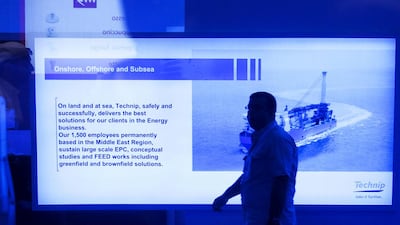Technip’s Abu Dhabi unit has been awarded a contract for a facility that is part of a US$17 billion project to capture gas from Iraq’s southern oilfields.
Basra Gas – which has a co-shareholding between Iraq’s government, Royal Dutch Shell and Mitsubishi – has been described as the world’s biggest flare reduction project by Shell and the largest gas project in the country’s history.
The plant began operations in April last year with an initial capacity to produce 400 million cubic feet a day, but once completed in 2017, the project will process 2 billion cubic feet a day. It captures associated gas, or natural gas found in oil deposits, from three oilfields in the south of Iraq – Rumaila, West Qurna 1 and Zubair.
Technip’s front-end engineering design contract, announced yesterday, will cover the “basic engineering design package of the natural gas liquids process units, utilities and the submission of an engineering procurement and construction package” for Ar Ratawi Natural Gas Liquids production facility at North Rumaila. The French oilfield services provider did not disclose the value of the contract.
“Technip’s operating centre in Abu Dhabi will execute the project, scheduled to be completed by the end of the year,” the company said yesterday.
“The project is the first of the new greenfield associated gas processing facilities that will significantly minimise gas flaring in Iraq and make energy resources available for power and domestic use,” the statement added.
The Ar Ratawi facility will have a capacity to produce 530 million cubic feet a day worth of liquefied petroleum gas, natural gas liquids and condensate for domestic markets.
Iraq, with the world’s fifth-largest oil reserves, is losing out on millions of dollars for burning off as much as 1 billion cubic feet of gas a day because it lacks the facilities to capture byproducts of crude, the deputy industry minister, Mohammed Zain, was quoted as saying by Bloomberg in October.
The country’s government has partnered with foreign investors to increase gas production, put an end to its power shortages and supply electricity stations, whose grids suffer from decades of war and are unable to meet demand requirements more than 10 years after the US-led invasion that deposed Saddam Hussein.
Iraq’s government has a 51 per cent shareholding in Basra Gas, while Shell holds 44 per cent and Mitsubishi the remaining portion. Iraq signed the 25-year agreement with the two companies in November 2011.
halsayegh@thenational.ae

